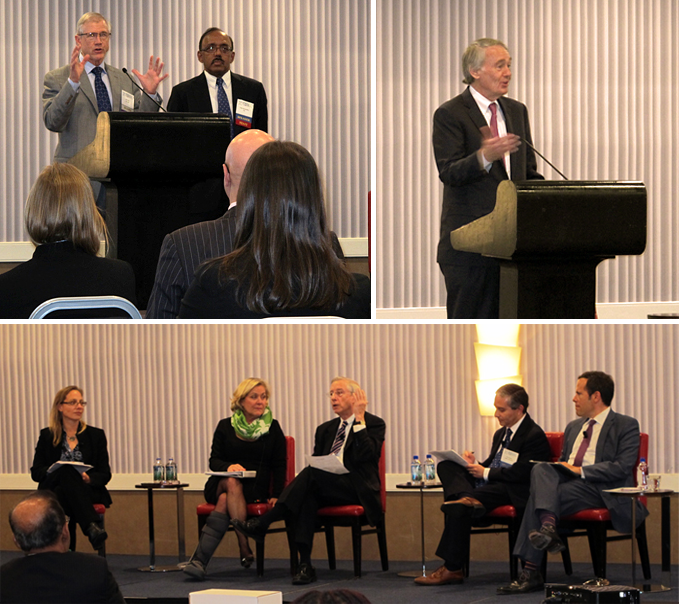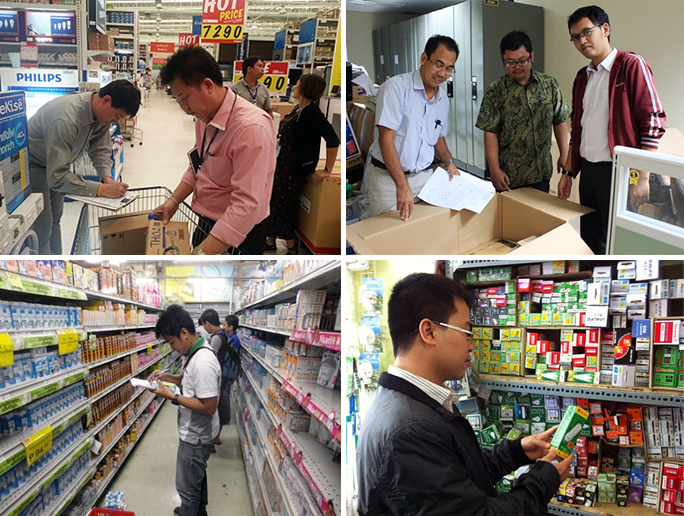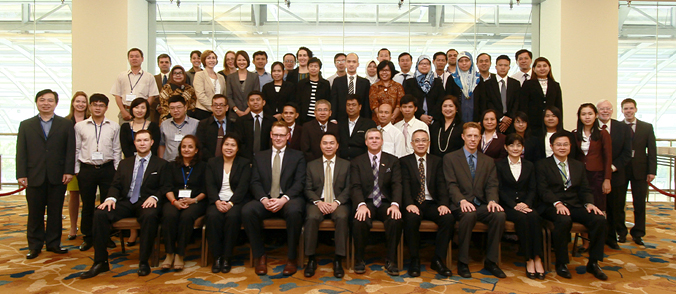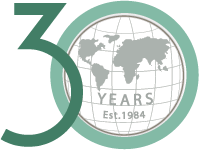|
 |
|
|
| |
|
Celebrating the Past by Looking to the Future:
IIEC’s 30th Anniversary
and Symposium
 This November, IIEC celebrated its first 30 years by welcoming energy and climate change experts from around the world to gather in Washington, DC and discuss the major challenges and solutions facing the global energy landscape. The Symposium featured keynote speeches by Senator Ed Markey of Massachusetts, and the executive director of the International Partnership for Energy Efficiency Cooperation (IPEEC), Benoit Lebot. Two panels led animated conversations about what approaches are working best in the climate and energy arena, and how to extend results to the people and places that need them most.
This November, IIEC celebrated its first 30 years by welcoming energy and climate change experts from around the world to gather in Washington, DC and discuss the major challenges and solutions facing the global energy landscape. The Symposium featured keynote speeches by Senator Ed Markey of Massachusetts, and the executive director of the International Partnership for Energy Efficiency Cooperation (IPEEC), Benoit Lebot. Two panels led animated conversations about what approaches are working best in the climate and energy arena, and how to extend results to the people and places that need them most. |

 Left to Right: Rob Pratt (GreenerU, IIEC), Felix Gooneratne (IIEC), Senator Ed Markey (of Massachusetts), Left to Right: Rob Pratt (GreenerU, IIEC), Felix Gooneratne (IIEC), Senator Ed Markey (of Massachusetts),
Laura Van Wie McGrory (IIEC), Kateri Callahan (the Alliance to Save Energy),
Reid Detchon (United Nations Foundation), Ivan Jaques (ESMAP/World Bank), David Rosenheim (the Climate Registry) |
| The evening’s discussions focused on the interrelation of energy, climate, and sustainable economic development, highlighting the importance of crosscutting solutions to help drive economies, secure resource access, and ensure that growth follows a clean and efficient path. Noting that a variety of clean energy models are emerging around the world, speakers highlighted the need for two central developments in the coming years – namely that projects be implemented on a large scale, and that they be based on economically sustainable models in order to become integrated into regional markets. Experts on both panels – “Emerging Issues in Energy Efficiency and Climate Change” and “Perspectives form IIEC’s Leaders” – acknowledged some of the major challenges attached to shifting human behavior and generating infrastructural change in developing countries, but balanced these comments by providing an overview of the tremendous economic and social opportunities associated with solving these challenges. Senator Markey closed his speech on an optimistic note, reminding a room full of technical experts and policymakers of the scope of human ingenuity. |
| “When someone tells you that we can’t ensure energy security through efficiency, you remind them that yesterday, a rocket landed on a meteor”! |

 Left to Right: Benoit Lebot (IPEEC), Matthew Mendis (Nexant), Deborah Bleviss (Johns Hopkins University, SAIS), Left to Right: Benoit Lebot (IPEEC), Matthew Mendis (Nexant), Deborah Bleviss (Johns Hopkins University, SAIS),
Russell Sturm (International Finance Corporation), Terry Oliver (Bonneville Power Administration), Felix Gooneratne (IIEC). |
Back to Top 
|
|
|
|
|
|
|
|
UNEP en.lighten Initiative Programme
 In the third-quarter of 2014, a lamp sampling activity in six Southeast Asian countries was conducted with collaboration between IIEC and the United Nations Environment Programme (UNEP). This effort was designed to strengthen and support national and regional resources for the monitoring, verification, and enforcement (MVE) of efficient lighting; these activities are essential to fostering a sustainable transition to efficient lighting. During the project period, representatives from the six countries – Cambodia, Indonesia, Lao PDR, Philippines, Thailand and Vietnam – had a chance to practice key MVE activities, such as taking samples of compact fluorescent (CF) and LED lamps from retailers and sending them to a third-party lighting laboratory in Beijing. These activities allowed authorities from each respective country to witness and take part in signing documents and packages necessary for maintaining the integrity of the program.
In the third-quarter of 2014, a lamp sampling activity in six Southeast Asian countries was conducted with collaboration between IIEC and the United Nations Environment Programme (UNEP). This effort was designed to strengthen and support national and regional resources for the monitoring, verification, and enforcement (MVE) of efficient lighting; these activities are essential to fostering a sustainable transition to efficient lighting. During the project period, representatives from the six countries – Cambodia, Indonesia, Lao PDR, Philippines, Thailand and Vietnam – had a chance to practice key MVE activities, such as taking samples of compact fluorescent (CF) and LED lamps from retailers and sending them to a third-party lighting laboratory in Beijing. These activities allowed authorities from each respective country to witness and take part in signing documents and packages necessary for maintaining the integrity of the program. |

 From left to right, the project team conducted market surveys of retail stores and supermarkets in Thailand; From left to right, the project team conducted market surveys of retail stores and supermarkets in Thailand;
Indonesia, Philippines and Vietnam |
|
|
|
|
|
Study on Developing “Vision 2030: Ozone and Climate Friendly Transition
for Buildings for Asia”
 The Compliance Assistance Program (CAP) of UNEP’s Regional Office in Asia and the Pacific has awarded IIEC a project to develop a comprehensive document on “Vision 2030: Ozone and Climate Friendly Transition for Buildings for Asia”. The objective of the project is to prepare a strategic vision document for Ozone- and Climate-Friendly transition in the Building sector across the Asia-Pacific region. About 88% of hydro chlorofluorocarbon (HCFC) consumption in Article 5 countries takes place in the refrigeration and air-conditioning sectors. Hence phasing out HCFC from buildings will have a significant impact on mitigating ozone depletion. The 2030 target for completely phasing out HCFCs will require that climate- and ozone- friendly alternatives be set in place throughout developing nations. Policies promoting energy efficiency in buildings and equipment will therefore have a far-reaching impact on phase-out methods. Additional objectives of the project include; building a resource pool that can act as a quick reference tool for policy makers and other key stakeholder, as well as drafting recommendations for maximizing ozone and climate benefits of HCFC phase-out in buildings for the region. A central database on the use of HFCs and HCFCs for the entire region will be created with details on the five selected countries – India, China, Thailand, Philippines and Fiji Islands.
The Compliance Assistance Program (CAP) of UNEP’s Regional Office in Asia and the Pacific has awarded IIEC a project to develop a comprehensive document on “Vision 2030: Ozone and Climate Friendly Transition for Buildings for Asia”. The objective of the project is to prepare a strategic vision document for Ozone- and Climate-Friendly transition in the Building sector across the Asia-Pacific region. About 88% of hydro chlorofluorocarbon (HCFC) consumption in Article 5 countries takes place in the refrigeration and air-conditioning sectors. Hence phasing out HCFC from buildings will have a significant impact on mitigating ozone depletion. The 2030 target for completely phasing out HCFCs will require that climate- and ozone- friendly alternatives be set in place throughout developing nations. Policies promoting energy efficiency in buildings and equipment will therefore have a far-reaching impact on phase-out methods. Additional objectives of the project include; building a resource pool that can act as a quick reference tool for policy makers and other key stakeholder, as well as drafting recommendations for maximizing ozone and climate benefits of HCFC phase-out in buildings for the region. A central database on the use of HFCs and HCFCs for the entire region will be created with details on the five selected countries – India, China, Thailand, Philippines and Fiji Islands. |
| For further information, please contact Sanjay Dube - sdube@iiec.org |
Back to Top  |
|
|
|
|
|
|
|
Scoping the Role of Private Finance Institutions in
Climate Finance
Across India
 GIZ India has awarded a project to IIEC India and Ricardo-AEA to study and report on how climate concerns affect investment decisions in India. This study seeks to assess the investments in various sectors of mitigation-related projects and seek an understanding of which best practices among private finance institutions can be scaled up. Particular consideration is being given to project selection, disbursement, monitoring and reporting. A particular focus shall be given to national mitigation schemes – such as the budget allocations for national action plans for climate change (NAPCC) or the state action plans for climate change SAPCCs and potentially internationally funded NAMAs – and how they can function as a vehicle to generate additional private climate finance. The main purpose of the study is to develop a kind of matrix, linking private financial actors with investment types across various mitigation sectors and activities with the aim of capturing best practices to scale up climate finance.
GIZ India has awarded a project to IIEC India and Ricardo-AEA to study and report on how climate concerns affect investment decisions in India. This study seeks to assess the investments in various sectors of mitigation-related projects and seek an understanding of which best practices among private finance institutions can be scaled up. Particular consideration is being given to project selection, disbursement, monitoring and reporting. A particular focus shall be given to national mitigation schemes – such as the budget allocations for national action plans for climate change (NAPCC) or the state action plans for climate change SAPCCs and potentially internationally funded NAMAs – and how they can function as a vehicle to generate additional private climate finance. The main purpose of the study is to develop a kind of matrix, linking private financial actors with investment types across various mitigation sectors and activities with the aim of capturing best practices to scale up climate finance. |
|
The core methodology of the study is to interact directly with the Indian private sector players to understand their perspective on climate finance, the role they envisage for themselves and how they are currently integrating climate concerns in their various investment decisions. |
| For further information, please contact Prima Madan - pmadan@iiec.org |
Back to Top  |
|
|
|
|
|
Sharing Energy Efficient Building Experiences in Singapore
 During 2-4 September, IIEC Vice President for North America, Laura Van Wie McGrory, participated in a Singapore-U.S. Energy Efficiency Buildings Workshop in Singapore. The three-day workshop – jointly conducted by the Building and Construction Authority (BCA)’s Centre for Sustainable Building of Singapore and the US Department of State’s Bureau of Energy Resources – was carried out as part of the Singapore-US Third Country Training Programme (TCTP) and the US-Asia Pacific Comprehensive Energy Partnership (USACEP). It was designed to provide participants from ASEAN countries, particularly those in the Lower Mekong, with a better understanding of issues related to energy efficient buildings applicable to the ASEAN region. Delegations participated from Brunei, Cambodia, Indonesia, Lao PDR, Malaysia, Myanmar, Philippines, Thailand, and Vietnam.
During 2-4 September, IIEC Vice President for North America, Laura Van Wie McGrory, participated in a Singapore-U.S. Energy Efficiency Buildings Workshop in Singapore. The three-day workshop – jointly conducted by the Building and Construction Authority (BCA)’s Centre for Sustainable Building of Singapore and the US Department of State’s Bureau of Energy Resources – was carried out as part of the Singapore-US Third Country Training Programme (TCTP) and the US-Asia Pacific Comprehensive Energy Partnership (USACEP). It was designed to provide participants from ASEAN countries, particularly those in the Lower Mekong, with a better understanding of issues related to energy efficient buildings applicable to the ASEAN region. Delegations participated from Brunei, Cambodia, Indonesia, Lao PDR, Malaysia, Myanmar, Philippines, Thailand, and Vietnam. |
|
Ms. Van Wie McGrory joined experts from BCA, the International Finance Corporation (IFC), and the US Green Building Council on a panel on Scaling up Construction of Green Buildings in Emerging Markets. Her presentation, “Promoting Energy Efficient Buildings in Developing Economies: Policy and Practice” focused on lessons learned from IIEC’s programs that have achieved significant and rapid energy savings in buildings through lighting retrofits in the Philippines, Lao PDR, and Malawi. |

 Delegates to the Singapore-U.S. Energy Efficiency Buildings Workshop Delegates to the Singapore-U.S. Energy Efficiency Buildings Workshop
|
|
Back to Top  |
|
|
|
|
|
Identification of Pilots of Affordable Housing – India
 The UK Department for International Development (DFID) has awarded a project to IIEC India and EDS for the identification of pilots for affordable housing. DFID is providing a 40 million pound concessional line of credit to the National Housing Bank (NHB) to finance the development of affordable housing projects. The program includes technical assistance to support state governments in developing affordable housing policies, and in developing and strengthening the systems of financing bodies like the National Housing Bank, and Housing Finance Companies. The objective of IIEC's work is to identify: The UK Department for International Development (DFID) has awarded a project to IIEC India and EDS for the identification of pilots for affordable housing. DFID is providing a 40 million pound concessional line of credit to the National Housing Bank (NHB) to finance the development of affordable housing projects. The program includes technical assistance to support state governments in developing affordable housing policies, and in developing and strengthening the systems of financing bodies like the National Housing Bank, and Housing Finance Companies. The objective of IIEC's work is to identify: |
| A pipeline of pilots that DFID could support on green technologies for affordable housing |
| A pipeline of pilots that DFID could support on rental or incremental housing |
|
The aim is to identify pilot projects that DFID could support in order to demonstrate effective innovations to increase the supply and demand for affordable housing in low-income states. |
|
|
|
|
|
Preparation of a Field Guide for Climate Efficient Industries
 The World Bank has awarded a contract to IIEC India and Ricarado-AEA to develop knowledge materials and operational tools for the overall climate efficient industries (CEI) work process. These knowledge materials and operational tools are expected to:
The World Bank has awarded a contract to IIEC India and Ricarado-AEA to develop knowledge materials and operational tools for the overall climate efficient industries (CEI) work process. These knowledge materials and operational tools are expected to: |
| Outline the procedural steps of a CEI program development from its inception to completion; |
| Inform policymakers and practitioners of the policies, programs, and financial instruments that may be most effective in responding to the specific situations of the reader’s country for driving CEI; |
| Aid policymakers and practitioners in the successful design and implementation of their own policies and programs on a national or sub-national level; |
| Form the structure that bridges intervention-focused toolkits and handbooks prepared within the CEI Initiative (i.e. Low-Carbon Zones: Practitioner's Handbook). |
|
The focus of work will be to collate respective information flow/ structure, design, and overall contextualization. The final product will be a Handbook, which can be used as a training material by World Bank Group staff and client governments. |
|
|
|
|
|
|
| |
|
About IIEC
 The International Institute for Energy Conservation (IIEC) was established in 1984 as a non-governmental (NGO), not-for-profit organization, in order to foster the implementation of energy efficiency in developing countries and countries in transition. IIEC’s mission is to accelerate the global adoption of energy efficiency, transport and environmental policies, technologies and best practices to enable sustainable economic and environmental development. The International Institute for Energy Conservation (IIEC) was established in 1984 as a non-governmental (NGO), not-for-profit organization, in order to foster the implementation of energy efficiency in developing countries and countries in transition. IIEC’s mission is to accelerate the global adoption of energy efficiency, transport and environmental policies, technologies and best practices to enable sustainable economic and environmental development. |
| For the past 30 years, IIEC has been providing solutions to the problems posed by the rapid increase of energy demand in developing and industrializing countries. IIEC has an established niche as a provider of novel solutions with the flexibility to work simultaneously with multilateral institutions, governments, academic and research institutes, industry and non-governmental organizations. |
|
 If you do not wish to receive IIEC E-Notes, please reply to e-notes@iiec.org with the word "UNSUBSCRIBE" in the subject line. If you do not wish to receive IIEC E-Notes, please reply to e-notes@iiec.org with the word "UNSUBSCRIBE" in the subject line. |
| |
 |
Leading the Transition to Clean Energy |
|
|
 |
| Head Office : |
 |
Asia Regional Office : |
Country Offices : |
|
USA
Tel: +1 703 464 0561
Fax: +1 703 689 4427
e-mail: iiecdc@iiec.org |
Thailand
Tel: +66 2 662 3460-4
Fax: +66 2 261 8615
e-mail: iiecbangkok@iiec.org |
India
Tel: +91 11 4182 8216/17
Fax: +91 11 4182 8217
e-mail: iiecindia@iiec.org |
Philippines
Tel: +632 426 8567
Fax: +632 426 8566
e-mail: iiecmanila@iiec.org |
|
 |
| Copyright © 2014 International Institute for Energy Conservation, All Rights Reserved. |
|
|
